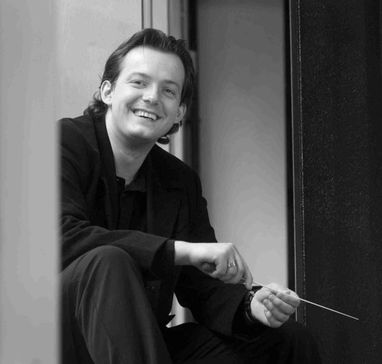Ashley's InsightsMusings on music, teaching, life, and interconnectedness. Archives
April 2020
Categories
All
|
Back to Blog
Happy New Year!1/1/2015 Happy 2015 to one and all!
I can't say I'm terribly sorry to see 2014 go. I got very sick during the last month and a half of the year, and that compounded with dealing with Ludwig's illness, a death in the family, and the various trials and tribulations of busy small-business ownership was hard to manage. I have high hopes for 2015. Ludwig is doing well with steady kidney numbers and his normal, spunky attitude, and I am finally on all sorts of meds for my own issues (look up hyperactive upper airway disorder if you're interested in what I'm talking about, but basically if I get a cold, it immediately mushrooms into a really serious cold with this extremely violent and uncontrollable cough that takes forever to go away; it's unpleasant). Business is good; I have a fantastic slate of students, and I'm slowly but surely getting better at keeping myself organized. I have room for a couple more appointments a week, but I'm pretty full up in general, which is a great problem to have. At midnight on December 31st, the second Kickstarter I ran in 2014 closed, raising $3425 out of a goal of $2500. This Kickstarter will allow Westford Chorus, a wonderful community chorus with some of the nicest people I have ever met, to perform Faure's Requiem with the orchestra called for by the composer. It may seem like a small order, but for small, underfunded groups, hiring an orchestra is a massive expense and can hinder more adventurous programming and musical progress. I am really excited about the prospect of using crowdfunding to keep community arts vibrant and viable. Gone are the days of the Medicis keeping artists in business; now artists are dependent upon small donations from many in the aether. Capital campaigns work for groups that have the name recognition, but Kickstarter is really showing itself to be a wonderful option for groups to reach out to friends and family worldwide and get a little help. With this in mind, I've added a consulting tab to this website and am officially marketing myself as a Kickstarter/social media consultant. I am willing to come on for small groups and perform an advisory role, teaching how crowdfunding/social media works and share the tips and tricks I have accumulated rather successfully thus far. I think this is a good merging of my two backgrounds of education and music, and I look forward to helping other groups meet their goals in 2015. I rang in the new year in my car last night. The local classic rock radio station, 100.7 WZLX, did its annual "1000 top classic rock songs of 2014' countdown, ending as the ball dropped in Times Square. I needed gas in my car, so I took the long way to hear the last few songs. As the clock turned over, I got to drive down a hill on the Fellsway East, blaring Led Zeppelin's Kashmir and watching the fireworks from Somerville coming over the tree line. It was a peaceful and elating at the same time. Let's hope that the same adjectives carry through the entire year for all of us. I have a good feeling they will (and that I will actually maintain this blog regularly!). :)
1 Comment
Read More
Back to Blog
On Language4/19/2014  Gabriel Garcia Marquez died Thursday. I admit, I have never been a rabid fan of his work (I probably never gave it the attention it warrants), but I have a massive amount of respect for his output and his legacy, which has reminded a large part of the literary world of the power of Spanish language literature. All too often we forget that the modern European novel owes its genesis to Spaniard Miguel de Cervantes (yes, I know Garcia Marquez was Colombian), and I know I am guilty of being woefully ignorant of all other Spanish language novels despite being a voracious reader. Part of this ignorance comes from my wish to read things in their original languages and I do not speak Spanish, but I read the Russians with regularity though I do not speak Russian (yet) and thus cannot count this as a valid excuse. Author William Kennedy called Garcia Marquez's novel One Hundred Years of Solitude “The first piece of literature since the Book of Genesis that should be required reading for the entire human race” in a New York Times book review; perhaps it is time for me to stop making excuses and start truly appreciating a massive section of the literary spectrum that I have neglected. I have had language in general on my mind today; I cannot figure out why. Perhaps it was hearing the name of such a literary behemoth repeated across all of the news outlets. Perhaps I have just been in a mood. On a lark I decided to rewatch the Late Late Show with Craig Ferguson episode without an audience where Craig Ferguson and Stephen Fry simply sit down and talk. I absolutely adore Craig Ferguson; I love his ability to navigate the waters of the absurd and the insightful. When he is conducting a serious interview or professing a genuine opinion, he is masterfully able to make a point with an air of complete sincerity and surprising insight. When he is goofing off with his robot skeleton sidekick or pantomime horse, he is ridiculous and uproariously funny. And the whole while he gives off an enthusiasm for his job, his situation, America, and seeing his guests succeed that makes the rest of the world a bit brighter for the people lucky enough to spend the hour watching. I also adore Stephen Fry. I tend to watch a great deal of British panel shows, and QI anchors my television docket. I feel a certain kinship with Mr. Fry; yes, he is Cambridge educated, but his persona as an academic seems to be more one of the autodidact. He comes across as loving knowledge of all kinds and plays the role of the bon vivant beautifully. I flatter myself that in this way we are quite similar; I tutor not to become rich (that is pretty much out of the question anyway) but because I love learning and I want to help others learn to love it too. I work across subjects not only because I can but also because I have a genuine interest and aptitude across subjects and find that I enjoy experiencing the world more when equipped with a wealth of facts and knowledge. I therefore follow Stephen Fry, his work, and his interviews fairly closely. In this particular interview, Ferguson and Fry jump from topic to topic, but they spend a few minutes discussing language and specifically Twitter. Both tout the poetry that can be found in being forced to condense communication into 140 meager characters, and both argue that the shorthand that has followed the Twitter and texting cultures (and indeed every form of communication where characters are at a premium) is harmless and indeed sensible. I would not presume to argue that this shorthand does not have a place in society; Fry is correct in that the character limit forces people to self-edit, and there is a particular beauty in the stripping bare that modern social media and digital communication facilitates. However, at the risk of sounding profoundly old-fashioned and perhaps closed minded, my admiration of "textspeak" is cautious at best. The issue that happens when one tries to implement a new variant of communication is that the "proper" means of communication ends up being subjugated. I see students on a daily basis struggle with writing papers or doing test prep because they have never learned proper English grammar; they cannot recognize comma rules or they mix tenses with no idea what they are doing wrong, and more worrying, they do not understand why this is a problem. I see the same kind of behavior with my music students who try to bypass the basics of learning to read the staff, count quarter notes, or learn basic repertoire and history in favor of doing overcomplicated things or creating electronic pieces with no idea why certain pieces go together or how things work. As a result, when I ask these students to actually join in discussion about their work, they are largely unable to express themselves in favor of "I just like it", which strips these students of their power. These students tend to plateau easier and then develop self-defeating attitudes that stifle real ability and improvement. There is an epidemic of trying to run before one can walk that makes me very uneasy with modern culture. The English language is an utterly beautiful and complex beast, and I wish I could make more students see this in today's society. The OED suggests that if we were to add together the modern lexicon, archaic or obsolete words, et cetera, the English language would contain roughly three quarters of a million words. This number is only growing as English continues to evolve and draw from other languages. This wealth of words allows us to communicate with extraordinary precision, and to me, this is more beautiful than the 140 character poetry of Twitter could ever be. If we look at syntax and the parts of speech, we can use the same exact set of words to mean multiple things, thus affording us with incredible power. I am not saying that English speakers should adopt a florid, overly verbose style of speech (though I tend to be quite wordy myself); there is no reason to try to revert back to Elizabethan English or the winding euphemistic language of the Victorian period. I simply become very uneasy when watching today's youth (and I include my own generation in this category) attempting to be conversant in a barebones version of English without being conversant in everyday written English. Often things that are more laid bare require a higher level of facility and nuance than things that are more involved (look at the compositions of someone like Steve Reich versus some kind of massive Wagnerian composition with forty parts working together; there is nowhere to hide in simplicity). By allowing students and young people to use text/Twitter style language in everyday use while not making a concerted effort to teach "proper" English, we are denying students important tools that they can use throughout life and propagate a culture of mediocrity that I have a very hard time accepting. In 2003 the British network ITV ran a documentary series on English presented by Melvyn Bragg called The Adventure of English. I watched it for the first time out of boredom maybe 4 years ago; I have seen it at least once a year since. The series personifies the English language; the viewer is left feeling as though English is a living, breathing entity, affected by major and minor events much the same way as societies and individuals are affected. It is a series created for popular consumption, and it accomplishes its goal very keenly. I am half tempted to add it to the beginning sessions for all of my test prep students. Language is a finicky, beautiful tool and cultural snapshot, and I wish it received more appreciation by today's youth and their teachers for all of its beauty and complexity. It truly is a living entity and holds a massive amount of wisdom for us all.
Back to Blog
Happy April Fool's Day!4/1/2014 I'm going to try to be better about actually blogging, I swear. Ludwig is feeling pretty good, Lise is being super affectionate at my side, and it's warmish outside. And I get to teach trigonometry this afternoon, so life is good. I, in the meantime, have been feeling bluesy as of late and may try to write/record a bit this week. So yes, for people who have been asking for stuff from me, it may actually happen. The problem is that I am incredibly self-conscious. I tell my students to be brave, but then I balk at auditions, write loads and hide it all. It bothered me last night at rehearsal when I passed up solo auditions because I got nervous. Fear is such a self-destructive emotion. It's a new month, so perhaps I'm saying that I resolve to change that. But for now, enjoy some Moody Blues. Because some days I truly am my father's daughter.
Back to Blog
A Statement of Purpose9/24/2013  Notre Dame de Paris Notre Dame de Paris I started this site with the intention of promoting myself as a musician, and I plan on continuing this route. However, my interests have always been many, and lately my teaching business has picked up, so I am deciding to divide this site's purpose between my music and my teaching passions. To me, the link between being a musician and being a teacher is obvious. Music is the quintessential interdisciplinary field; to be a good musician and a good musical scholar, one needs to have a strong grasp not only on music theory and performance practice but also on mathematical relationships, acoustics, plot structure, and the historical and political context behind the music and performance. One could go on for days about how the context of the time and the architecture of Notre Dame de Paris were pivotal in shaping the polyphony of Leoninus and Perotinus or how Iannis Xenakis carefully designed the Phillips Pavilion at the 1958 World Expo to create a wall of sound out of something as mundane as burning charcoal. I will not do this here, but I will assert that yes, a person can study the theory and technical aspects of a piece and "learn" it on a certain level, but he/she will not truly be able to understand and appreciate it without some degree of background, be it historical, mathematical, or otherwise. If someone were to ask me why I am qualified to teach across many subjects, I would argue that I am a good musician; I have endeavored to learn as much as possible in many fields and continue to do so, and I truly enjoy sharing what I have discovered with others. Music therapy is a widely known treatment for anxiety and a wide array of developmental issues that capitalizes upon the universal nature of music. Children with speech and language issues can often see massive breakthroughs when words are put to song. Repetitive counting and layering of rhythms can help strengthen fundamental math skills as well as life and study skills. And the general enjoyment of music alone can help reduce stress and stress-related issues in everyone. I have worked to incorporate many of the same techniques I use to reduce tension as a singer into exercises with my students, and I have myriad pieces of anecdotal evidence showing how stress reduction leads to academic success. Because I seek to work with individual students and small group settings, I make it a point to get to know every student and build a connection. I am not a therapist, but I can incorporate some of the same principles that makes music therapy so successful for so many. As I continue to develop this site and myself as a musician, teacher, and I guess as a businesswoman, I will endeavor to further flesh out my feelings as to how music and education overlap on this blog, and I hope to document my own trials and successes along the way. It should be an interesting journey.
Back to Blog
A Momentous Day for Boston and for Music6/25/2013  Andris Nelsons (photo by Adrian Burrows) Andris Nelsons (photo by Adrian Burrows) Today I had the astounding opportunity to see classical music history in the making. A coworker of my friend Callie sings with the Tanglewood Festival Chorus and and thus had an invitation to see conductor Andris Nelsons take the helm of the Boston Symphony Orchestra; knowing my passion for orchestral music and background, she invited me along for a "lunchtime Q&A and speech-making". I, of course, would have in no way passed this opportunity up. Andris Nelsons has big shoes to fill; he is officially the Music Director Designate until the start of the 2014-2015 season and will at that point succeed James Levine as the 15th Music Director of the BSO. Born in Latvia in 1978, Maestro Nelsons is a trained trumpeter and has been the much lauded conductor of the City of Birmingham Symphony Orchestra since 2008. He grew up in a highly musical family and is married to soprano Kristīne Opolais, who recently made waves in her Met debut as Magda in Puccini's La Rondine. With such a pedigree, one can only imagine and hope that Maestro Nelsons carries on the stellar musicianship, forward momentum, and energy Maestro Levine injected into the BSO during his reign. Having had the pleasure of hearing Andris Nelsons speak about his artistic vision, his background, and his wishes to become a part of the Boston fabric, I at least have no doubt of his energy. He waxed philosophical at every corner about how music feeds the soul and pandered to the Boston crowd, calling the city America's cultural center. He spoke about attending sporting events (he's throwing out the first pitch at Fenway tonight), getting a "large apartment" in the city for his young family, and invigorating the BSO with his favorites, Bruckner and Shostakovich, all with the dazed and giddy look of a young man trying to convince himself that this pageantry is all real. While James Levine sparked criticism for dividing his time and focus between Boston and the Met, Andris Nelsons seems poised to reinvigorate the Boston classical music scene both with his baton and his public persona and thus reclaim music's rightful place at the cultural center of the city. I don't think it is a secret to anyone that the classical music world is at a crossroads. The new media revolution and an aging demographic have shrunk concert attendance, and a studied arrogance and elitism that permeates the scene has been effective at alienating younger patrons. Boston particularly has the added challenge of being home to a staggering number of high-quality arts groups all competing for a shrinking audience. As someone with an eye on these trends and a purely selfish stake in overcoming them, I have been watching the BSO as it has searched for James Levine's replacement to see how, if at all, their choice would reflect an effort to combat this decline as well. I am admittedly a fan of James Levine; I have seen him both at Symphony Hall and Lincoln Center, but in one short hour, Andris Nelsons won me over as the perfect choice for Boston musically and politically. Today's event began with introductory speeches by Ted Kelly and Maestro Nelsons, and they included many of the platitudes one would expect to hear in such a situation. However, Maestro Nelsons soon made an analogy that really struck me in terms of audience development; to paraphrase, Maestro Nelsons asserted that just as one needs to periodically go to the doctor for a physical check-up, so must one periodically experience live music for a "check-up of the soul". Andris Nelsons in one very brief statement, essentially issued a manifesto carving out the BSO's place in Boston; he does not see classical music, or really any art form, as being ancillary to the nature of the city or its denizens, and he seems willing to put in the work to humanize himself and the symphony and thus regain relevance. We musicians and smaller organizations can learn a great deal from just this simple introduction to Andris Nelsons. Too often we forget in the course of our programming and planning why we do it all. Performing live music is not a hobby and not a treat; it is something that a significant portion of the populace devotes countless hours to rehearsing and participating in. Live music is both a check-up for the soul as Andris Nelsons asserted today and an essential part of the human experience. Music serves as a time capsule, capturing both the mood of a composer and his/her peers and the mood and practices of the groups performing that composer's work at any given time. It communicates to the masses intricate emotions that no other language has truly been able to fully express and carries with it an unbelievable amount of power and nuance. If we as musicians and artists can create an honest and complete context for what we do; if we can stand behind our work with the same kind of conviction, high-mindedness, and unabashed hope, I believe we can begin to reverse this trend of shrinking audiences and increased obscurity. Good luck, Maestro Nelsons; I look forward to hearing you in Symphony Hall. |
 RSS Feed
RSS Feed
